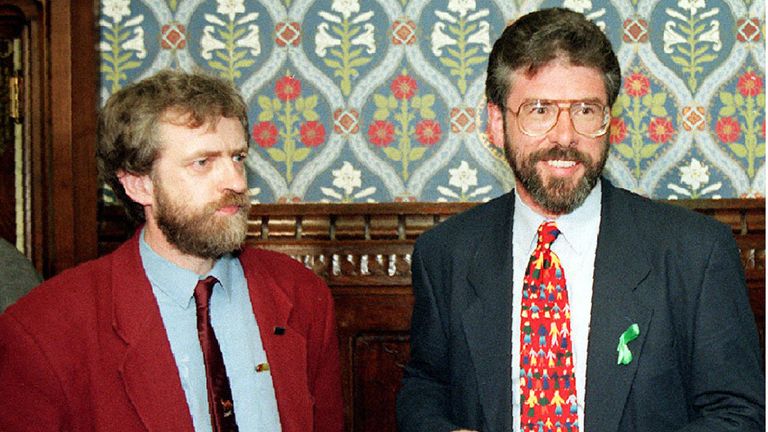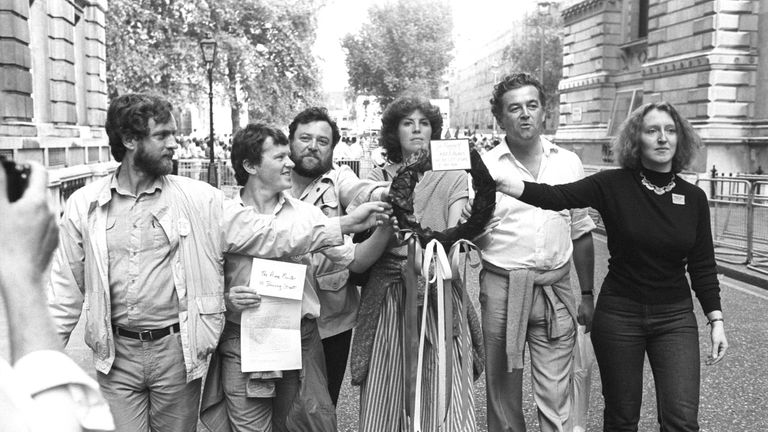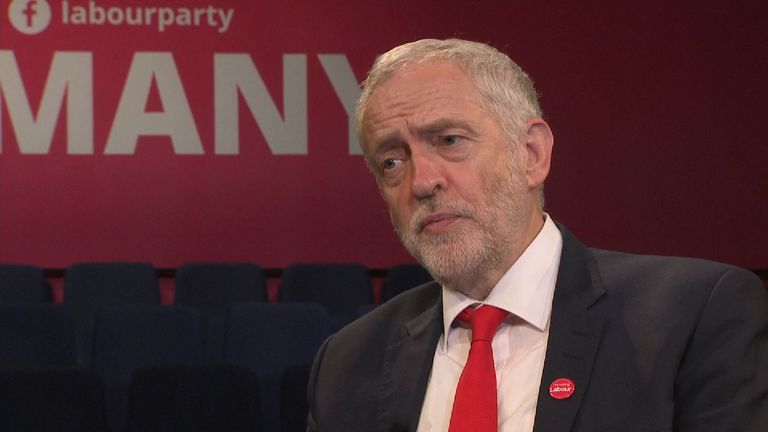Labour leader Jeremy Corbyn denies supporting or meeting IRA
The left-winger already faces criticism over his refusal to condemn the terror group directly, amid claims he met its members.
Friday 26 May 2017 22:38, UK
Jeremy Corbyn is facing fresh controversy over his support for the Irish republican movement after claiming: "I never met the IRA".
The Labour leader, already under attack from opponents over his past support for a united Ireland, said he did not support the terror group and does not now.
But his denial came after The Daily Telegraph reported last weekend that MI5 opened a file on him in the early 1990s and
Mr Corbyn was asked by Andrew Neil in a BBC TV interview why people would want him as Prime Minister given his previous support for the IRA.
He replied: "I didn't support the IRA. I don't support the IRA. What I want everywhere is a peace process. What I want everywhere is decency and human rights."
Asked about a minute's silence he observed in 1987 for eight IRA members killed by the SAS in Gibraltar, he said it was "for all who'd died" in Northern Ireland.
And questioned by his interviewer if he urged the IRA to stop the bombs, Mr Corbyn replied: "I never met the IRA.
"I obviously did meet people from Sinn Fein, as indeed I met people from other organisations, and I always made the point that there had to be a dialogue and a peace process."
Mr Neil later asked: "Isn't the truth that you've basically supported the armed struggle for a united Ireland, but now you want to be Prime Minister you have to distance yourself from it?"
Mr Corbyn said: "No. What I want is peace. What I want is to learn the lessons from Northern Ireland and also to make sure during the Brexit negotiations we don't return to or receive any kind of hard border between the North and the Republic."
Also in the BBC interview, Mr Corbyn said the role of Trident nuclear weapons would form part of a defence review Labour has promised if it wins the election on 8 June.
He declined seven times to say he personally supports the renewal of saying only that it was party policy which would be put into effect in office.
Asked repeatedly whether he supported keeping the nuclear deterrent, he said: "I voted against the renewal.
"Everybody knows that because I wanted to go in a different direction. That is the decision that's been taken; I respect that decision going ahead.
"We're going ahead with the programme which has been agreed by Parliament and voted on by the Labour Party."
But he suggested the role of nuclear weapons would be up for consideration in a strategic defence review planned if Labour won the election.
"It will look at the role of nuclear weapons as it will look at everything," he said. "It will look at the totality, as every other government assuming office has had a Strategic Defence Review."
Mr Corbyn's denials about the IRA came a week after the Telegraph's report that MI5 opened a file on him amid concerns over his links to the IRA and fears that he could have been a threat to national security.
According to the paper, he supported one of the Balcombe Street gang, which waged a 14-month bombing campaign, and also had links to a bomb maker believed to have been behind the Hyde Park and Regents Park attacks.
The paper also said on one occasion it was reported in a Sinn Fein newspaper that he shared a platform with an IRA volunteer who was wanted over the killing of an SAS soldier and whose extradition had been requested by the British Government.
The Telegraph also reported that Mr Corbyn was visited in the Commons by Gerard McLochlainn, the former "voice of Sinn Fein in London", who had recently been released from prison for conspiracy to detonate explosives, and Linda Quigley, who had also been recently released from a sentence for IRA-related offences.
The pair attended just weeks after Margaret Thatcher was targeted in the Brighton bombing, which killed five people, including the Conservative MP Sir Anthony Berry, the paper said.
After the Telegraph's allegations, in an interview with Sophy Ridge on Sunday on Sky News.
In his Sky News interview, Mr Corbyn said "all bombing is wrong", adding: "I condemn all the bombing by both the loyalists and the IRA."
Mr Corbyn also defended his association with IRA-linked rallies in the 1980s, saying: "I wanted to bring about peace in Northern Ireland. You have to talk to people with whom you don't agree. And I did."
Responding to the BBC interview, Priti Patel, Secretary of State for International Development, said: "Corbyn didn't answer a single question in that interview. He spent half an hour trying to escape from everything he had said and done in his 30 years in politics.
"The fact is he backed the IRA, doesn't support NATO, wouldn't renew Trident, wants to increase immigration and wants to massively increase taxes on working families."






